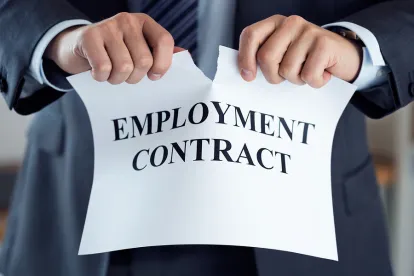In a matter of weeks, COVID-19 has changed the workplace. Travel restrictions, shelter-in-place orders, and mandatory closures have meant that it is far from business as usual for nearly all employers. The unprecedented events of the last few weeks have forced many employers, facing major business disruptions or closures, to make tough decisions about hiring, layoffs, furloughs, and compensation.
Some of these employment decisions may implicate written employment contracts and collective bargaining agreements that contain “force majeure” clauses that excuse performance if certain events should occur. Black’s Law Dictionary defines “force majeure” as “an event or effect that can be neither anticipated nor controlled.” The frequency of force majeure clauses varies by industry. In the healthcare industry, force majeure clauses became more common in employment agreements after Hurricane Katrina. Other industries may follow suit in the wake of this pandemic.
The question many employers are now asking is whether COVID-19 allows them to invoke the force majeure clauses in their employment contracts to excuse their inability to perform their contractual obligations. And the answer is: It depends.
As with most things in the legal world, the devil is in the details. Initially, employers should closely examine the language and scope of the contract because not all force majeure clauses are created equal. Some contracts may specifically delineate “pandemics,” “epidemics,” or “outbreaks of disease” as force majeure events. Other contracts, however, may contain more general force majeure clauses that refer to “Acts of God” or “events which are outside of the parties’ control.” No doubt, many parties will end up litigating whether COVID-19 qualifies as a force majeure event under these more general clauses.
But even if an employment contract clearly contemplates an epidemic or a pandemic such as COVID-19, as a force majeure event, there are still other issues that employers need to examine:
-
Consider whether the employment contract (or applicable state law) imposes an obligation on the party invoking the force majeure event to timely notify the other party of its inability to perform under the contract. For example, collective bargaining agreements may include notice provisions that require employers to provide the union with timely notice of the employer’s inability to perform under the contract as a condition of being able to rely on the clause.
-
Evaluate whether the force majeure provision excuses the employer’s nonperformance completely, or only during the pendency of the force majeure event. For instance, if an employer has made an employment offer to a prospective employee but the business has stopped operating due to a statewide shelter-in-place or quarantine order, the employer should consider whether the force majeure provision allows the employer to withdraw the offer entirely or simply delays the prospective employee’s start date until the business can resume operations.
-
When seeking to rely upon a force majeure clause, an employer may still be under a duty to mitigate the impact that COVID-19 has on its ability to perform under the employment contract. In fact, the contract may even delineate what mitigation steps the employer should take. For example, many employers have attempted to mitigate the effects of shelter-in-place orders by allowing employees to work from home.
Even where no express force majeure clause exists to excuse nonperformance, the common law doctrines of impossibility, impracticability, and frustration of purpose may fill that void. Further discussions of these doctrines can be found here and here.
Employers should also consider how they can incorporate the lessons learned from COVID-19 into their future employment contracts. Force majeure clauses are sometimes thrown in as a matter of boilerplate, but no drafter should include such a clause without fully considering the potential consequences. See e.g., Commonwealth Edison Co. v. Allied-General Nuclear Serv., 731 F. Supp. 850, 855 (N.D.Ill. 1990) (Posner, J.) (“If, however, the parties include a force majeure clause in the contract, the clause supersedes the doctrine [of impossibility].”) Employers should consider clarifying any vague or ambiguous force majeure clauses and ensure that pandemics, epidemics, and other outbreaks of disease are specifically carved out as force majeure events. General force majeure clauses that do not specifically include pandemics in their definitions may not provide protection during a future pandemic if courts find that such events have now become foreseeable. Equally important, employers should think about what contractual remedies are available to the parties if a force majeure event should occur. For example, employers should consider whether to include liquidated damages remedies in the event that a force majeure event requires termination of the contract. Employers should also review the “choice of law” provisions in their employment contracts and determine how widely or narrowly the courts in the chosen jurisdiction have interpreted force majeure clauses.
Perhaps one of the most important takeaways from COVID-19 is to value contingency planning and have business continuity plans in place. Indeed, preparing for business disruptions in this way may obviate the need for some employers to invoke force majeure clauses at all.




 />i
/>i
